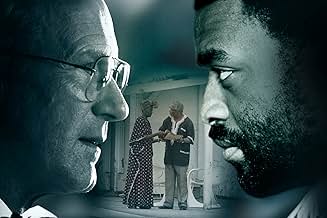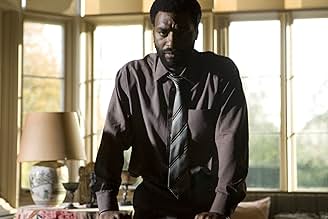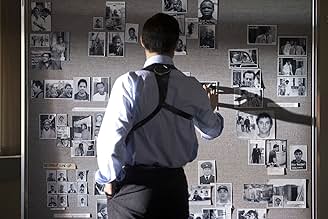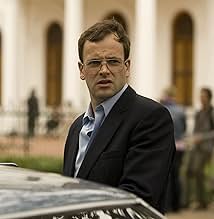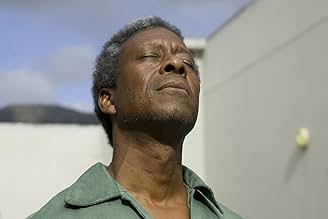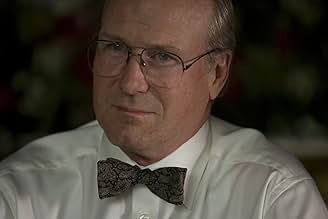CALIFICACIÓN DE IMDb
6.2/10
2.9 k
TU CALIFICACIÓN
Una historia basada en las discusiones encubiertas que acabaron con el régimen del Apartheid en Sudáfrica.Una historia basada en las discusiones encubiertas que acabaron con el régimen del Apartheid en Sudáfrica.Una historia basada en las discusiones encubiertas que acabaron con el régimen del Apartheid en Sudáfrica.
- Dirección
- Guionistas
- Elenco
- Nominado a 1 premio Primetime Emmy
- 16 nominaciones en total
- Dirección
- Guionistas
- Todo el elenco y el equipo
- Producción, taquilla y más en IMDbPro
Opiniones destacadas
Its not a great game but a very watchable film and with South Africa somewhat topical 2009-10 (I have faith like potatoes to watch) (and Invictus in the pipeline)I enjoyed the history lesson of the film and the insight that privateers such as Michael Young helper not only the peace in south Africa but are lending a hand with Hamas as we speak and involved themselves on the Northern Ireland peace deal as well. didn't Clerk come in and steal inevitable glory from Botha and I was left wondering more about Mandelas relationship with the ANC bad guys who are in power now (the real terrorists?0 but i did enjoy the movie. it is an objective film, not over-acted, doubt if it will win any awards but don't miss it!
Shot in a manner very resonant of Frost/Nixon with outstanding editing Endgame is a fittingly unsentimental and very nicely played drama of the last days and brinkmanship of the apartheid negotiations in South Africa.
With competent performances from all involved this is not overacted but rather relies on the relationships and the materials. Cutting between South Africa and the UK it tells the story of the two sides: the Afrikaans government on the one, and the ANC and Pan-African parties on the other. How they came to find a path in what was probably the most volatile of all post-colonial politics to not lead to civil war is the story. Through the efforts of an Afrikaans philosophy professor (William Hurt) and a British troubleshooter for the gold mines (Johnny Lee Miller, who is in excellent form, less manic suits him very well indeed) the players first arrange to meet, meet, and work through the issues. Filmed in South Africa (A lot of outdoor shots) and the UK, this has more story than you'd think on first sight. It has some action scenes, but in the main it is a nicely poised political drama.
The film scores points for exceptional use of camera and again I have to mention the editing which is outstanding: rarely missing a beat and playing its focus on both the players and the reactions this is a first-class lesson is how film editing can make the story better and worth watching on that basis alone if film-making is your thing.
For those of us who remember the marches, the cause, and Mandela walking through the prison gates with Winnie, this films not only gives meat to the bones of the background to that history; it is evocative without being sentimental.
This is a film that needed to be made; and I for one wish that we could see more of this ilk - it is a strong reminder of the best that humans are capable of.
With competent performances from all involved this is not overacted but rather relies on the relationships and the materials. Cutting between South Africa and the UK it tells the story of the two sides: the Afrikaans government on the one, and the ANC and Pan-African parties on the other. How they came to find a path in what was probably the most volatile of all post-colonial politics to not lead to civil war is the story. Through the efforts of an Afrikaans philosophy professor (William Hurt) and a British troubleshooter for the gold mines (Johnny Lee Miller, who is in excellent form, less manic suits him very well indeed) the players first arrange to meet, meet, and work through the issues. Filmed in South Africa (A lot of outdoor shots) and the UK, this has more story than you'd think on first sight. It has some action scenes, but in the main it is a nicely poised political drama.
The film scores points for exceptional use of camera and again I have to mention the editing which is outstanding: rarely missing a beat and playing its focus on both the players and the reactions this is a first-class lesson is how film editing can make the story better and worth watching on that basis alone if film-making is your thing.
For those of us who remember the marches, the cause, and Mandela walking through the prison gates with Winnie, this films not only gives meat to the bones of the background to that history; it is evocative without being sentimental.
This is a film that needed to be made; and I for one wish that we could see more of this ilk - it is a strong reminder of the best that humans are capable of.
It's 1985 South Africa. Public affairs director of Consolidated Goldfields Michael Young (Jonny Lee Miller) sneaks into a township looking for people to secretly negotiate with. Eighteen months later in London, he makes contact with ANC Head of Information Thabo Mbeki (Chiwetel Ejiofor). He is stalked by government agents as he tries to convince Professor Willie Esterhuyse (William Hurt) to join in the effort. Head of intelligence Dr. Neil Barnard (Mark Strong) meets Nelson Mandela (Clarke Peters) in prison. Company head Rudolph Agnew (Derek Jacobi) finances the secret meetings but will deny any knowledge of Michael's plans if discovered. In 1988 Somerset, England, the group gathers to negotiate in a palatial estate.
This is a drama of an important moment in history. The first half hour has great tension as Michael scrambles to organize this negotiation. The suspense is mostly lost once the group gathers at that mansion. The outcome is never in doubt. The actors are strong and they keep it watchable.
This is a drama of an important moment in history. The first half hour has great tension as Michael scrambles to organize this negotiation. The suspense is mostly lost once the group gathers at that mansion. The outcome is never in doubt. The actors are strong and they keep it watchable.
The end of the hated Apartheid regime in South Africa is an uplifting story, but also, as told in this drama-documentary, an oddly undramatic one. There was no revolution, nor even a commitment to reform from within. Instead, as the system became increasingly untenable on the ground in the face of growing popular unrest, a series of unofficial negotiations between prominent Afrakaaners and the opposition were eventually endorsed by F.W. de Klerk shortly after his appointment as leader of the country, in a tacit acknowledgement that he had run out of other options. Undramatic maybe, but this is still a worthy retelling of the mechanics of the process. It's surprising to see Thabo Mbeki, later much criticised as a later south African leader when he denied that H.I.V. causes A.I.D.S., portrayed here in such a positive light. William Hurt is completely convincing as an Afrikaaner, while 'Wire' veteran Clarke Peters captures the essence of Nelson Mandela with a delicate performance . There's an element of hagiography in the film's treatment of the men who negotiated, but it is justifiably an uplifting story, especially in the knowledge of how, in the main, Mandela has managed to justify his status as virtual deity since his release; and how, for all its continuing problems, South African society has not collapsed with democracy.
"Endgame," a British film that premiered on PBS' "Masterpiece Contemporary" but also played briefly in theaters in America, provides us with a behind-the-scenes glimpse into the waning days of South African Apartheid.
The time is the 1980s. While political prisoner Nelson Mandela languishes behind bars and violent uprisings rend the fabric of the nation, the white-minority Afrikaner government led by President P.W. Botha has declared the ANC (the African National Congress) to be an illegitimate terrorist organization run by communists and therefore unworthy of a seat at the table in any negotiations concerning the role of blacks in the future of South Africa. Into the breach stride a number of crucial players who are attempting – at great personal risk to themselves and their families - to bring the two opposing sides together through secretive talks being held at an estate in the English countryside. Present at that event are Michael Young (Jonny Lee Miller), a British businessman whose company has vital interests in South Africa and who sees the eventual abolishment of Apartheid as a good and necessary thing on both a professional and moral level; Thabo Mbeki (Chiwetel Ejiofor), a representative from the ANC; and Willie Esterhuyse (William Hurt), a philosophy professor who seems to see both sides of the issue and can therefore serve as an honest broker between the two factions (though the government also sees him as a potentially useful spy for its own side). Mandela (Clarke Peters) and Botha (Timothy West) also appear as characters, with the latter trying to convince the former to denounce the ANC's acts of violence, using subtle tactics of persuasion to do so.
Written by Paula Milne and directed by Pete Travis, "Endgame," which is based on the book "The Fall of Apartheid" by Robert Harvey, strikes a careful balance between conversational sit-downs, where agreements are reached and terms hashed out, and the kind of breath-bating, cloak-and-dagger espionage sequences that are a crucial part of any political thriller. The characters are all thoughtful, three-dimensional men who have strong opinions on matters but who are also open to new ideas and compromise and who often have to contend with their own fears, prejudices and self-doubts before they can finally come to a workable resolution. The movie manages to be intimate in tone while, at the same time, never neglecting the broader political and social canvas against which this small-scale drama is taking place. The result is a well-acted, informative and dramatically compelling re-creation of recent history.
And beyond its purely academic function, "Endgame" serves as an inspirational reminder that it sometimes takes just a handful of brave, morally decent and right-thinking people willing to forget their differences and to come together in a common cause to make the world a better place.
The time is the 1980s. While political prisoner Nelson Mandela languishes behind bars and violent uprisings rend the fabric of the nation, the white-minority Afrikaner government led by President P.W. Botha has declared the ANC (the African National Congress) to be an illegitimate terrorist organization run by communists and therefore unworthy of a seat at the table in any negotiations concerning the role of blacks in the future of South Africa. Into the breach stride a number of crucial players who are attempting – at great personal risk to themselves and their families - to bring the two opposing sides together through secretive talks being held at an estate in the English countryside. Present at that event are Michael Young (Jonny Lee Miller), a British businessman whose company has vital interests in South Africa and who sees the eventual abolishment of Apartheid as a good and necessary thing on both a professional and moral level; Thabo Mbeki (Chiwetel Ejiofor), a representative from the ANC; and Willie Esterhuyse (William Hurt), a philosophy professor who seems to see both sides of the issue and can therefore serve as an honest broker between the two factions (though the government also sees him as a potentially useful spy for its own side). Mandela (Clarke Peters) and Botha (Timothy West) also appear as characters, with the latter trying to convince the former to denounce the ANC's acts of violence, using subtle tactics of persuasion to do so.
Written by Paula Milne and directed by Pete Travis, "Endgame," which is based on the book "The Fall of Apartheid" by Robert Harvey, strikes a careful balance between conversational sit-downs, where agreements are reached and terms hashed out, and the kind of breath-bating, cloak-and-dagger espionage sequences that are a crucial part of any political thriller. The characters are all thoughtful, three-dimensional men who have strong opinions on matters but who are also open to new ideas and compromise and who often have to contend with their own fears, prejudices and self-doubts before they can finally come to a workable resolution. The movie manages to be intimate in tone while, at the same time, never neglecting the broader political and social canvas against which this small-scale drama is taking place. The result is a well-acted, informative and dramatically compelling re-creation of recent history.
And beyond its purely academic function, "Endgame" serves as an inspirational reminder that it sometimes takes just a handful of brave, morally decent and right-thinking people willing to forget their differences and to come together in a common cause to make the world a better place.
¿Sabías que…?
- TriviaWilliam Hurt and Mark Strong also appeared in El amanecer de un siglo (1999), Syriana (2005) and Robin Hood (2010).
- ErroresAt the beginning of the movie it clearly shows that the speedometer is at 0 while driving down the road.
- Citas
Epilogue: When the IRA decided to negotiate a peaceful solution to the Irish conflict, they secretly turned to the ANC
[African National Congress]
Epilogue: for advise on how to do it. They are now advising Hamas on the same strategy.
- ConexionesFeatured in The 62nd Primetime Emmy Awards (2010)
- Bandas sonorasLow Life
Performed by Scanners
Written by Sarah Daly and Matthew Mole
Courtesy of Influx Music Ltd./Dam Mak Records/Rhino Independent
By Arrangement with Warner Music Group Film & TV Licensing
Selecciones populares
Inicia sesión para calificar y agrega a la lista de videos para obtener recomendaciones personalizadas
- How long is Endgame?Con tecnología de Alexa
Detalles
- Fecha de lanzamiento
- Países de origen
- Idiomas
- También se conoce como
- Kampen om Sydafrika
- Locaciones de filmación
- Productoras
- Ver más créditos de la compañía en IMDbPro
Taquilla
- Total en EE. UU. y Canadá
- USD 9,645
- Fin de semana de estreno en EE. UU. y Canadá
- USD 1,608
- 8 nov 2009
- Total a nivel mundial
- USD 26,260
- Tiempo de ejecución
- 1h 49min(109 min)
- Color
- Mezcla de sonido
- Relación de aspecto
- 2.35 : 1
Contribuir a esta página
Sugiere una edición o agrega el contenido que falta


